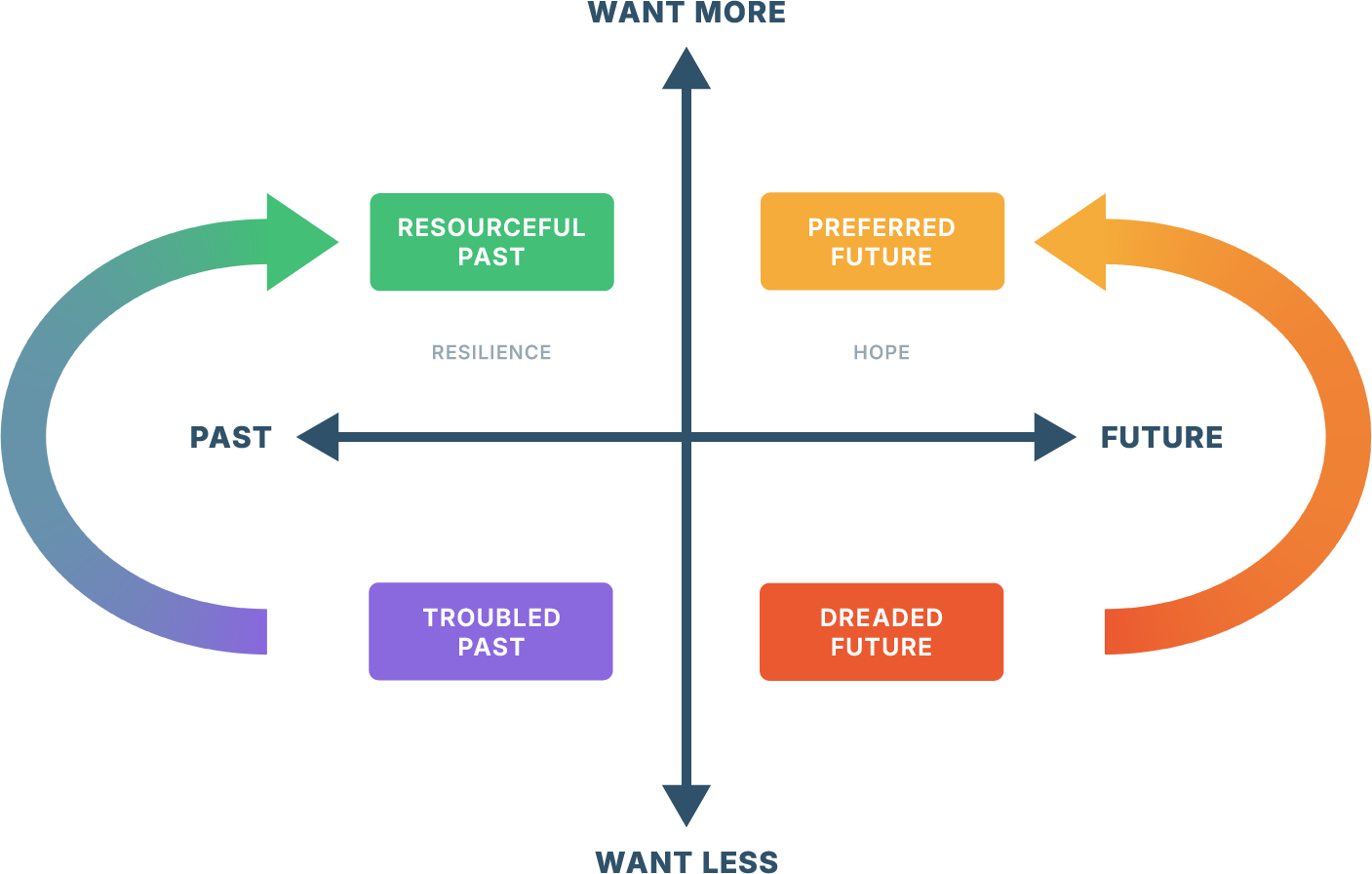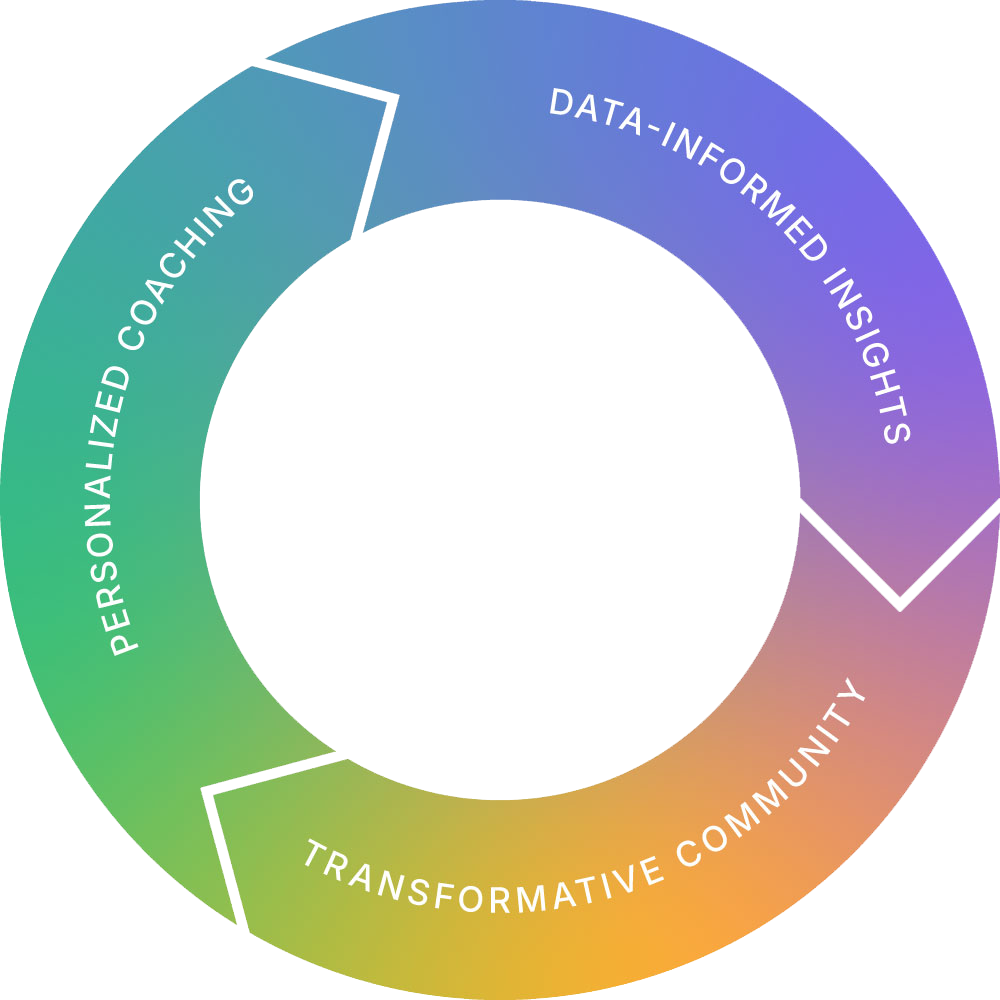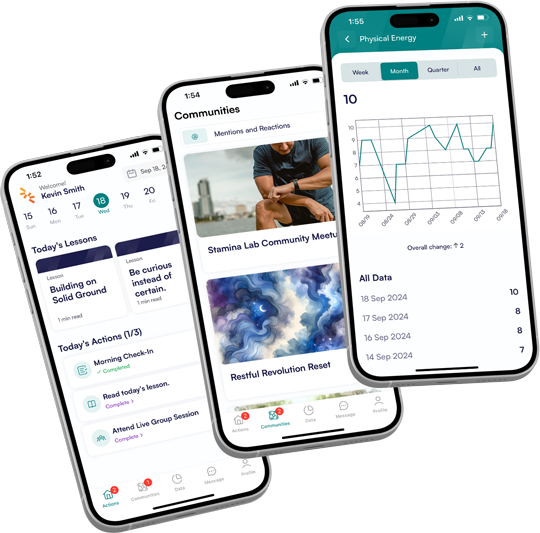Stamina Lab’s Solution-Focused Approach Informs All We Do

Stamina Lab’s Health Optimization Platform features a solution-focused approach. This is an evidence-based approach that promotes positive, sustainable behavior change.
It’s a true paradigm shift from traditional ways of helping people change behavior because it focuses on competence, not pathology; and on what works, not what’s wrong.
Our solution-focused approach helps foster change and transformation because it assumes that people are competent and have the necessary resources to live more satisfying lives on their own terms in ways that are uniquely right for them.
Being solution-focused has a huge impact on our work because we deliberately set aside problem narratives, diagnoses, and labels that can pathologize people and lock them into narrow definitions of what they are capable of doing and what the future holds for them.
Instead, we view each individual as a human being who:
- Is motivated for something (to be different)
- Is doing the best they can with what they have in the context of their lives
- Has good reasons for what they’re doing, even if it’s “bad”
- Has skills, strengths, and resources to draw on that can create openings and expand possibilities for change.
Being solution-focused means that we take a neutral and “not knowing stance” that maintains our curiosity and optimism. This helps us open doors for clients so they see themselves from wholly new and more positive perspectives.
We are on constant alert for:
- signs of effective coping, strengths and skills
- evidence of resources–internal and external
- resilience
- competence
- achievement & progress
Our solution-focused approach is far more than a technique or method. It’s the lens through which we see the world and the people in it. It is the atmosphere we embody and the air we breathe. It’s simply who we are.
We presuppose greatness in people. We presuppose the possibility of their desired outcomes. We presuppose that they want what’s best for themselves. And that they can make it happen.

What Makes Stamina Lab’s Solution-Focused Approach So Powerful?

A unique feature of the solution-focused approach is that it uses strategic prompts and questions to expand clients’ perceptions of what they’re capable of and the rich life they have the capacity to create for themselves. It’s a process that harnesses the power of mental imagery and visualization.
Through a carefully crafted solution-focused conversation, clients suspend their limiting beliefs and self-defeating narratives. They replace them with vivid descriptions of what they’ll be doing differently and how their lives will be different when their preferred future is realized.

Our solution-focused approach is powerful because it enables clients to:
- See themselves taking action and completing each step in a process to effectively carry out prescribed health-promoting behaviors.
- Create the picture of meeting milestones and goals, which ultimately translates into personal transformation.
- Notice themselves experiencing positive internal states and emotions, including confidence, resilience, and the satisfaction and reward of success.
Our solution-focused approach naturally embeds health-promoting behaviors into a vision of everyday life in a better future, which builds in sustainability from the start.
Using mental imagery is powerful because it capitalizes on the brain’s ability to stimulate the same neural pathways that are used during actual performance. Because the brain doesn’t distinguish between vividly imagined and real experiences, the solution-focused approach gives clients a felt perception and experience of successful change.
How Does Our Solution-Focused Approach Work?
Our solution-focused approach works because we focus on competence, not pathology; what works, not what’s wrong.Instead of the problem, we begin with the end in mind–what clients wants, what they’ll be doing in the future when they have what they want, what they’ll be doing differently and what will be different in their relationships and environment in this better future.
We instill confidence by communicating our belief that change and a better future are possible by helping clients:
- Find their own unique solutions to their problems. We don’t impose cookie-cutter fixes for a problem
- Identify exceptions to the problem which fosters optimism
- Examine past successes to support and increase client confidence
- Recognize that they are the experts of their own experience and lives, knowing what works for them and fits their needs, interests, values, and preference. We don’t assume to know.
- Take personal responsibility and own their own solutions
- Chart a path to change based on what’s already working and what life will be like when their desired outcomes are present in their lives.
Often, clients discover remarkable ways of being and doing that would otherwise be missed and that typically lead to unique, powerfully effective, and sometimes very surprising solutions.

What Makes Stamina Lab’s Platform Unique
Stamina Lab’s Health Optimization Platform offers a comprehensive, multi-dimensional program grounded in a solution-focused approach to help people make lasting behavior changes that result in improved health and wellbeing.
The program features Stamina Lab’s Three Pillars of Health Optimization:

Personalized Coaching
Personalized coaching is the first of Stamina Lab’s three pillars. Delivered in a group coaching setting and/or in 1:1 individualized sessions.

Data-Informed Insights
Stamina Lab’s Platform allows clients and coaches to collect, monitor, and track a variety of health and wellness parameters including sleep.

Transformative Community
Humans are social animals, so nothing could be more important to good mental and physical health than social connections.


Personalized Coaching
Personalized coaching is the first of Stamina Lab’s three pillars. Delivered in a group coaching setting and/or in 1:1 individualized sessions, coaching begins by helping clients define the outcomes they want and exploring, discovering, and amplifying the strengths, skills, and resources they already have.
Coaching sessions are supplemented and reinforced by daily check-ins, monthly quests focusing on a specific component of physical, emotional, cognitive, and social wellness.
In general, health and wellness coaches carry out a range of tasks–from assessment and evaluation, planning, tracking, and monitoring, to offering advice, encouragement, and support.
Personalized coaching is the first of Stamina Lab’s three pillars. Delivered in a group coaching setting and/or in 1:1 individualized sessions, coaching begins by helping clients define the outcomes they want and exploring, discovering, and amplifying the strengths, skills, and resources they already have.
An Strong Internal Locus of Control and Psychological Flexibility Are Key
The numbers don’t lie. Whether it’s epilepsy, chronic pain, Crohn’s disease, depression, anxiety, diabetes, stress, or a substance use disorder, a strong internal locus of control is what makes the difference in health outcomes because it fuels agency and self-efficacy, which ultimately contributes to a person’s overall sense of empowerment and leads to effective action.
A large body of research demonstrates that patients with a stronger internal locus of control do better adhering to recommended medical regimens, managing symptoms, recovering from relapses, engaging in activities of daily living, and reporting great satisfaction with life.


How the Stamina Lab Health Optimization Platform Works for Coaching
Our unique approach is based on a synthesis of results from rigorous experimental and empirical research in human behavior, combined with evidence-based approaches in psychotherapy that have been adapted for use in the health and wellness context.
Most, if not almost all programs designed to help patients make lasting change, including coaching programs, start with the problems—the things that bring the person into the program in the first place.
The Problem With Problems
The problems include the issues clients are struggling with, barriers that hold them back, triggers that lead to problematic behavior, the likelihood of unwanted consequences if the problem persists, difficult relationships that keep them from doing their best, and weaknesses and deficits that contribute to the problem.
In the coaching context, most coaches begin with an assessment to understand the client’s problems—even doing root-cause analysis–to reveal or explain the underlying pathology that holds people back from doing what they should to live the life they want. Distorted thinking, poor emotional regulation, self-defeating behaviors, and lack of motivation are some of the problems commonly cited.
Diving deep to explore the problems is grounded by the belief that by understanding the full nature of the problem, a coach can then create a solution to offer the client and work on it with them.
But assessing problems inherently reveals and amplifies a client’s failings and deficits, which easily induces feelings of shame, guilt, self-blame–feelings that many people who seek out the services of coaches already feel.


What You Focus on Grows
Replicated many times in many ways and many contexts, research about human attention shows that what we focus on grows.
Whether it’s described as habit-loops, neuropathways, cognitive biases, or in other terms to describe how our brains work, focusing on problems, and personal failings and deficits reduces a person’s confidence and sense of empowerment, and leads to decreased hope and motivation, greater self-doubt and blame.
On the other hand, vast research shows that predictors of good adherence and good outcomes of self-managed, home-based health interventions–the context for almost all health and wellness coaching–include self-efficacy, agency, self-motivation, mastery, and sense of purpose.
These predictors hold true for chronic conditions across the board, whether what’s being managed is Crohn’s disease, epilepsy, depression and anxiety, diabetes, or cardiovascular disease.
Data-Informed Insights
Stamina Lab’s Platform allows clients and coaches to collect, monitor, and track a variety of health and wellness parameters including sleep, energy, and other factors that contribute to wellbeing, guiding patients with personalized recommendations to drive real change.
One thing that distinguishes Stamina Lab’s approach to data is that while we respect and use the insights the data provide, the data aren’t the sole drivers of how we work with clients. That’s because data capture only so much. We see our job as helping clients balance their own experience and expertise about themselves with what the numbers suggest.
As Albert Einstein noted, “Imagination is more important than knowledge. For while knowledge defines all we currently know and understand, imagination points to all we might yet discover and create.”


Transformative Community
Humans are social animals, so nothing could be more important to good mental and physical health than social connections and community.
Although the psychosocial and neurobiologic characteristics of resilience to stress are extremely complex, it is well documented that good social support offers protective effects against stress, enhances resilience, and may moderate genetic and environmental vulnerabilities.
Social support is defined in research literature as manifesting in two dimensions:
- a structural dimension, which includes network size and frequency of social interactions
- a functional dimension with emotional (such as receiving love and empathy) and instrumental (practical help)
Most research has found that the quality of relationships (eg, love, empathy, and practical help) is a better predictor of good health than the quantity of relationships and frequency of interactions, although both are important.
It is with the importance of emotional support and help in mind, that Stamina Lab’s platform features an online community for robust social support and engagement.

References
Abdulla, A. (2024). Solution-Focused Scaling Questions: Time Taken, Words Written, Expectancy and Commitment.International Journal of Coaching Psychology, 5, 3, 1-15.
Franklin, C., Zhang, A., Froerer, A., & Johnson, S. (2017). Solution-focused brief therapy: A systematic review and meta‐summary of process research. _Journal of Marital and Family Therapy,_ 43(1), 16-30.
Gong, H., & Xu, W. (2015). A meta-analysis on the effectiveness of solution-focused brief therapy. _Studies of Psychology and Behavior_, 13, 799-803.
Grant, A. & Gerrard, B. (2019). Comparing problem-focused, solution-focused and combined problem-focused/solution-focused coaching approach: solution-focused coaching questions mitigate the negative impact of dysfunctional attitudes. Coaching: An International Journal of Theory, Research and Practice. 13. 1-17.
Anthony M. Grant & Sean A. O’Connor (2018): Broadening and building solution-focused coaching: feeling good is not enough, Coaching: An International Journal of Theory, Research and Practice,
Kim, J., Jordan, S.S., Franklin, C., Froerer, A. (2019). Is solution-focused brief therapy evidence-based? An update 10 years later. _Families in Society: The Journal of Contemporary Social Services_, 100, 1-12.
Kim, J. S., Smock, S., Trepper, T., McCollum, E., & Franklin, C. (2010). Is solution-focused brief therapy evidence-based? _Families in Society: The Journal of Contemporary Social Services_, 91, 3894-4009.
Kitai, A., Shimada, Y., Tagoo, M., & Otomo, M. (2023). Can a Solution-Focused Coaching Approach Go Beyond the Ocean and Campus? Comparing Solution and Problem-Focused Approaches for Japanese Students and Business People. Journal of Solution Focused Practices, 7(1).
Korman, H., Bavelas, J.B., & De Jong, P. (2013). Microanalysis of formulations in solution-focused brief therapy, cognitive behavioral therapy, and motivational interviewing. _Journal of Systemic Therapies_, 32(3), 31–45.
Jordan, S.S. (2014). Asking different questions: Validation of the solution building inventory in a clinical sample. _Journal of Systemic Therapies_, 33(1), 78-88.
Jordan, S.S., Froerer, A.S., & Bavelas, J.B. (2013). Microanalysis of positive and negative content in solution-focused brief therapy and cognitive behavioral therapy expert sessions. _Journal of Systemic Therapies_, 32(2), 46–59.
Kim, J. S. (2008). Examining the effectiveness of solution-focused brief therapy: A meta-analysis. _Research on Social Work Practice_, 18(2), 107-116.
Richmond, C. J., Jordan, S. S., Bischof, G. H., & Sauer, E. M. (2014). Effects of solution-focused versus problem-focused intake questions on pre-treatment change. _Journal of Systemic Therapies_, 33(1), 33-47.
Solms L, Koen J, van Vianen AEM, Theeboom T, Beersma B, de Pagter APJ and de Hoog M (2022) Simply effective? The differential effects of solution-focused and problem-focused coaching questions in a self-coaching writing exercise. Front. Psychol. 13:895439
Zhang, A., Franklin, C., Currin-McCulloch, J., Park, S., & Kim, J. (2018). The effectiveness of strength-based, solution-focused brief therapy in medical settings: A systematic review and meta-analysis of randomized controlled trials. _Journal of Behavioral Medicine_, 41, 139-151.

